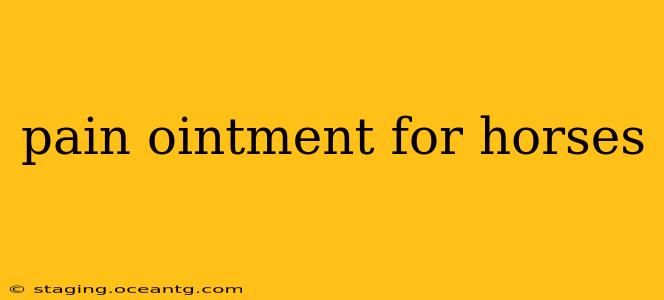Horse owners know that even the most robust equine athletes can experience pain and discomfort. Whether it's from an injury, arthritis, or muscle soreness, finding the right pain relief is crucial for your horse's well-being and performance. This guide explores various pain ointments for horses, their uses, and what to consider when choosing one. We'll also address some frequently asked questions surrounding equine pain management.
What Types of Pain Ointments are Available for Horses?
The market offers a range of topical pain relief options for horses, each with its own active ingredients and applications. Common ingredients include:
-
Non-Steroidal Anti-Inflammatory Drugs (NSAIDs): These are often the cornerstone of many equine pain ointments, effectively reducing inflammation and pain. However, it's crucial to use NSAIDs under veterinary guidance, as they can have side effects if misused. Always consult your vet before applying any NSAID-containing ointment.
-
Topical Analgesics: These ointments work by numbing the affected area, providing temporary pain relief. They're often used for minor injuries or localized discomfort.
-
Herbal Remedies: Some ointments incorporate natural ingredients like arnica, menthol, or camphor, which have mild analgesic and anti-inflammatory properties. While generally safe, their effectiveness can vary.
-
Counterirritants: These ointments don't directly reduce pain but create a counter-irritant effect, distracting from the underlying discomfort. Examples include products containing methyl salicylate or capsaicin.
What are the Different Uses of Pain Ointments for Horses?
Pain ointments for horses aren't a one-size-fits-all solution. Their application depends largely on the type of pain and its underlying cause. Common uses include:
-
Muscle Soreness: After strenuous exercise, topical analgesics or anti-inflammatory ointments can help soothe aching muscles.
-
Minor Injuries: For minor cuts, bruises, or sprains, ointments can reduce swelling and pain, promoting faster healing.
-
Arthritis: Some ointments containing NSAIDs can provide relief from the stiffness and pain associated with arthritis. However, this should always be part of a comprehensive veterinary-managed treatment plan.
-
Back Pain: Topical treatments can offer some comfort for horses experiencing back pain, but addressing the root cause is vital.
It's imperative to remember that ointments are generally best for localized pain relief and shouldn't replace veterinary care for serious injuries or conditions.
How Do I Choose the Right Pain Ointment for My Horse?
Selecting the appropriate pain ointment requires careful consideration. Factors to consider include:
-
The type and severity of the pain: A minor injury may respond well to a topical analgesic, while chronic arthritis might require an NSAID-containing ointment under veterinary supervision.
-
Your horse's overall health: Existing medical conditions can influence the choice of ointment. Always consult your veterinarian before using any new product.
-
The ingredients: Consider any potential allergies or sensitivities your horse might have.
-
The application method: Some ointments require careful massage into the skin, while others can be applied more liberally.
-
Your vet's recommendations: This is the most important factor. Your veterinarian can assess your horse's condition and recommend the most suitable ointment for their specific needs.
What are the Potential Side Effects of Using Pain Ointments on Horses?
While generally safe when used as directed, some potential side effects of pain ointments for horses include:
-
Skin irritation: Allergic reactions or sensitivities to specific ingredients can occur.
-
Absorption into the bloodstream: Some ingredients, particularly NSAIDs, can be absorbed into the bloodstream, potentially leading to systemic side effects if misused. This emphasizes the need for veterinary guidance.
-
Ineffectiveness: For severe pain or underlying conditions, a topical ointment alone may not be sufficient.
Can I Use Human Pain Ointments on My Horse?
No. Human pain ointments are not formulated for horses and may contain ingredients toxic to them. Always use only equine-specific products.
When Should I Consult a Veterinarian Regarding My Horse's Pain?
Consult your veterinarian immediately if:
- Your horse is showing signs of severe pain or discomfort.
- The pain doesn't improve or worsens despite using an ointment.
- Your horse is exhibiting any unusual behavior or symptoms.
- You're unsure about which ointment to use.
By carefully considering the type of pain, your horse’s overall health, and your veterinarian's recommendations, you can choose the most appropriate pain ointment to provide your equine companion with effective and safe relief. Remember, responsible horse ownership includes seeking professional veterinary advice for any health concerns.
